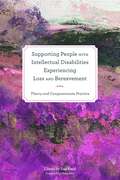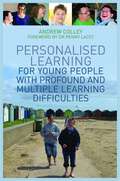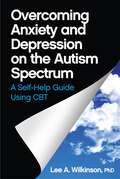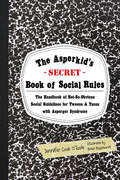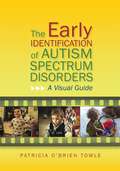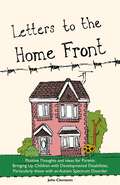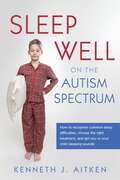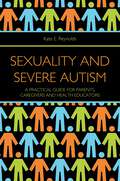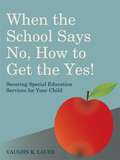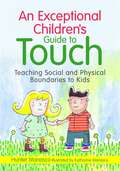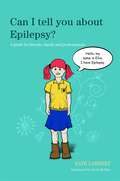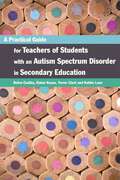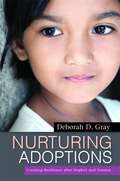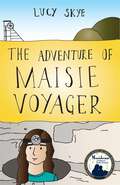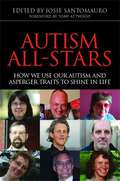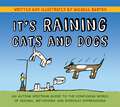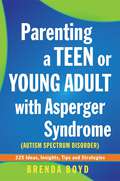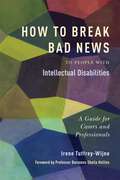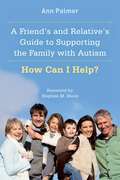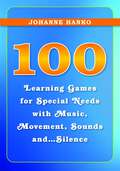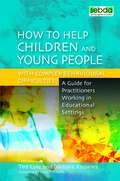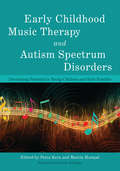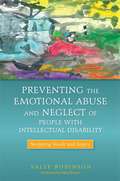- Table View
- List View
What Is It Like to Be Me?: A Book About a Boy with Asperger's Syndrome
by Katarina Kompan Erzar Branka D Jurisic Tony Attwood Alenka Klemenc Ursa RozicJoin Greg, a young boy with Asperger's syndrome (AS), as he tells us all about the world as he sees and experiences it. We learn about all the things he loves, including his routine and numbers, as well as his special interest in batteries (he even has a rectangular one!). Greg also tells us about the things that he finds challenging, from a change in his beloved routine to reading facial expressions, and how these things can sometimes leave him upset and overwhelmed. By explaining the way he feels and how best to calm him down when it all gets too much, Greg helps us to understand AS and how it affects the way he views the people and objects around him. With comprehensive sections for parents and professionals on AS and the impact it can have on the family unit and life in the wider community, this charmingly illustrated book helps to increase awareness and understanding of Asperger's syndrome. It will be of interest to families of children with autism spectrum disorders, as well as teachers and other professionals working with children on the autism spectrum.
Supporting People with Intellectual Disabilities Experiencing Loss and Bereavement: Theory and Compassionate Practice
by Noelle Blackman Rachel Forrester-Jones Erica Brown Mike Gibbs Helena Priest Philip J Larkin Michele Wiese Ted Bowman Suzanne Guerin Ben Hobson Professor Owen Barr William Gaventa Sue Read Linda Machin Philip Dodd Mary Davies Mandy Parks Karen Ryan Patsy CorcoranExploring contemporary theory and practice surrounding loss and bereavement for people with intellectual disabilities (ID), this book brings together international contributors with a range of academic, professional and personal experience. This authoritative edited book looks at diverse experiences of loss across this population whether it be loss due to transition, the loss or death of others, or facing their own impending death. The book begins by offering theoretical perspectives on loss and compassion, bereavement, disenfranchised grief, spirituality, and psychological support. It then addresses contemporary practice issues in health and social care contexts and explores loss for specific communities with ID including children, individuals with autism, those in forensic environments, and those at the end of life. Identifying inherent challenges that arise when supporting individuals with ID experiencing loss, and providing evidence and case studies to support best practice approaches, this book will be valuable reading for students, academics and professionals in the fields of disability, health and social care.
Personalised Learning for Young People with Profound and Multiple Learning Difficulties
by Andrew ColleyChallenging the notion that young people with profound and multiple learning difficulties (PMLD) should be taught in a linear, target-driven way, this book presents an innovative model for creating learning opportunities to suit the needs and abilities of each individual student. Focusing on students with PMLD aged 14 and over, and addressing their unique needs as they progress towards adult life, the author explains how to create a truly personalised programme for each individual that recognises their right to autonomy whilst also acknowledging their learning difficulties. Practical strategies for dealing with common areas of difficulty such as communication and behaviour are included, and the book contains useful solutions to practical considerations such as timetabling, staffing, assessments and target-setting, and adapting the physical and sensory environment for students with PMLD. A final section looks at opportunities for students with PMLD post-secondary education. Realistic and accessible, this book is essential reading for teachers, teaching assistants and others involved in educating young people with PMLD.
Overcoming Anxiety and Depression on the Autism Spectrum: A Self-Help Guide Using CBT
by Lee WilkinsonCognitive Behavioral Therapy (CBT) has been shown to be effective for treating mental health problems such as anxiety and depression in individuals both with and without autism spectrum disorders. This book bridges the gap between research and practice and shows adults on the spectrum practical ways to manage their emotions. Many adults on the autism spectrum experience isolation, interpersonal difficulties, anxiety, depressed mood, and coping problems. By applying theory and concepts from autism research, this book will help adults on the spectrum to understand their challenges. The author takes the best of CBT self-help strategies, to encourage self-analysis, and to help adults on the spectrum make better decisions in activities such as employment or relationships. This is an essential self-help guide for adults on the spectrum looking for ways to cope with emotional challenges, and will also be a useful resource for clinicians, psychologists, therapists, and counselors working with them.
The Asperkid's (Secret) Book of Social Rules: The Handbook of Not-So-Obvious Social Guidelines for Tweens and Teens with Asperger Syndrome
by Brian Bojanowski Jennifer Cook O'TooleBeing a teen or tween isn't easy for anyone but it can be especially tough for Asperkids. Jennifer O'Toole knows; she was one! This book is a top secret guide to all of the hidden social rules in life that often seem strange and confusing to young people with Asperger syndrome. The Asperkid's (Secret) Book of Social Rules offers witty and wise insights into baffling social codes such as making and keeping friends, blending in versus standing out from the crowd, and common conversation pitfalls. Chock full of illustrations, logical explanations, and comic strip practice sessions, this is the handbook that every adult Aspie wishes they'd had growing up. Ideal for all 10-17 year olds with Asperger syndrome, this book provides inside information on over thirty social rules in bite-sized chunks that older children will enjoy, understand, and most importantly use daily to navigate the mysterious world around them.
The Early Identification of Autism Spectrum Disorders: A Visual Guide
by Patricia O'Brien TowleIdentifying Autism Spectrum Disorder (ASD) as early as possible can have a significant, positive impact on the child's journey to adaptation and independence. Yet too few diagnoses take place at an early, developmentally crucial stage. This unique visual guide aims to equip readers with the skills to recognise ASD in very young children. The book provides a systematic framework for understanding the complex nature of ASD. From social interaction to communication to restricted and repetitive behaviors, each chapter focuses on key symptoms and uses photographs to illustrate and enhance understanding of presenting or absent behaviors. It is written in an accessible style and covers all of the core aspects of ASD, giving readers everything they need to be able to successfully identify the behavioral indicators of autism. A final chapter provides an overview of assessment options for young children being evaluated for possible ASD. Taking a visual approach to identifying ASD in very young children, this book will be a valuable resource for early intervention professionals and students, occupational therapists, speech and language therapists, psychologists, paediatricians, teachers as well as parents of children pre- and post-diagnosis.
Letters to the Home Front: Positive Thoughts and Ideas for Parents Bringing Up Children with Developmental Disabilities, Particularly those with an Autism Spectrum Disorder
by John ClementsBringing up a child with developmental disabilities, especially autism, presents many challenges for parents, and the focus of attention is almost invariably on the child. This practical and compassionate book looks at a range of issues from the parents' point of view - from whether their child really loves them, to challenging received wisdom on matters such as sensory integration and boarding school. The author's many decades of experience of working with families provide the basis for this practical support and help in thinking about and approaching some of the most difficult and intractable issues. One, often unvoiced, concern for parents is whether their children love or care about them. The first section of the book consists of three letters from young people to their parents, showing clearly that though they may never have been able to say so directly, they do love and appreciate their parents, and what they have done for them - a strong message for all parents in a similar situation. Clements goes on to look at how the parenting agenda changes over time, how to see beyond the diagnoses and the constant need to deal with immediate problems, to see the real people who make up the family, the impact on siblings, how to manage the system and the multiple professional agencies over long periods of time, and how to think about the offer of medication to control behaviour. An important section addresses some of the most distressing behavioural challenges: physical aggression, verbal abuse, long-term severe self-injury, property damage, and obsessions. Finally, Clements offers objective and open-minded reflections on received wisdom about two other unchallenged topics - sensory integration, and the usefulness or otherwise of boarding schools. The book is practical, compassionate, and above all, useful. It will be of ongoing use to parents, and equally useful to professionals working with families encountering the issues covered.
Sleep Well on the Autism Spectrum: How to recognise common sleep difficulties, choose the right treatment, and get you or your child sleeping soundly
by Kenneth AitkenWhy are sleep disorders more common in individuals with autism spectrum disorders (ASDs), and how can parents recognise the signs and symptoms? Which treatments are most effective, how easy are they to implement and how successful can they be? Full of helpful information and practical advice, this comprehensive guide introduces the most common sleep issues in children with ASDs, describing both mainstream and complementary options for treatment, what is involved and the outcomes that can be expected. The author describes common underlying conditions that might lead to sleep difficulties, including genetic conditions, diet and physical factors, explaining how parents can identify these. Various issues that can affect sleep are explored, including night terrors, teeth grinding, bedwetting and sleepwalking, and practical solutions are given. This is essential reading for parents of children and teenagers on the autism spectrum who have difficulties associated with sleeping, and will also be of great help to all individuals with ASDs who experience sleep problems.
Sexuality and Severe Autism: A Practical Guide for Parents, Caregivers and Health Educators
by Kate E. ReynoldsSexual health and sexuality can be difficult subjects for parents and caregivers to broach with autistic children, made more challenging when children are at the severe end of the autism spectrum. Some parents may even question the validity of teaching sexuality to those who are severely autistic. This practical handbook guides you through the process of teaching about sex and sexuality, answering all of the most crucial questions, including: Why is it necessary to teach this subject to my severely autistic child? When is the right time to start talking about these issues? How detailed and explicit should I be? What methods are most appropriate? It addresses male and female issues separately and covers public and private sexual behaviours, sexual abuse, cross-gender teaching and liaising with school, in addition to the more obvious areas such as physical changes and menstruation. This will be the ideal guide to teaching about sexual issues for any parent, caregiver or health educator caring for a person on the severe end of the autism spectrum.
When the School Says No...How to Get the Yes!: Securing Special Education Services for Your Child
by Vaughn LauerWhen planning a child's Individualized Education Program (IEP), it is vital that parents and educators are involved in collaborative decision making. This book offers parents of children with autism and other disabilities a unique way of approaching and tackling the problems that can arise relating to the provision of special education services. Taking a structured, cooperative approach to IEPs, the easily applicable six question process enables parents to determine the needs of their child and obtain the services required by asking key questions during IEP meetings. Explaining the approach through real life scenarios and issues, this book demonstrates how to achieve effective collaboration with school personnel, ensuring the child receives the appropriate and necessary educational program and services. Providing a practical, structured approach to IEP planning for parents and offering insight into the parental perspective for educators, this book is an invaluable resource for anyone involved in IEP meetings.
An Exceptional Children's Guide to Touch: Teaching Social and Physical Boundaries to Kids
by McKinley Hunter ManascoThe rules of physical contact can be tricky to grasp and children with special needs are at a heightened risk of abuse. This friendly picture book explains in simple terms how to tell the difference between acceptable and inappropriate touch, thereby helping the child with special needs stay safe. <P><P>Each story covers a different type of touch from accidental to friendly to hurtful and will help children understand how boundaries change depending on the context. It explores when and where it is okay to touch other people, when and where other people can touch you, why self touching sometimes needs to be private, and what to do if touch feels inappropriate. <P><P>This book is an invaluable teaching resource and discussion starter for parents, teachers and carers working with children with special needs.
Can I tell you about Epilepsy?: A guide for friends, family and professionals
by Scott Hellier Kate LambertMeet Ellie - a young girl with epilepsy. Ellie invites readers to learn about epilepsy from her perspective. She introduces us to some friends who help present the varying forms of epilepsy. Ellie and her friends help children to understand the obstacles that they face by telling them what it feels like to have epilepsy, how it affects them physically and emotionally, how epilepsy can be treated and how the condition is often misunderstood by people who do not know the facts. This illustrated book is full of useful information and will be an ideal introduction for children from the age of 7. It will also help parents, friends, and professionals to make sense of the condition in its varying forms and will be an excellent starting point for family and classroom discussions.
A Practical Guide for Teachers of Students with an Autism Spectrum Disorder in Secondary Education
by Debra Costley Elaine Keane Kathleen Lane Trevor ClarkStudents on the autism spectrum often face difficulties in the secondary education environment that result from a lack of awareness on the part of their teachers and peers. This guide acquaints teachers with all the information and practical tools needed to understand and support their students with autism spectrum disorders (ASD). The book presents specific, ready-to-use classroom initiatives with example worksheets, checklists and timetables to help students keep organised with their school work. It also covers general obstacles such as social situations, anxiety, mental health issues and extracurricular activities and how adults can help. Guidance about the leaving school stage and how to ensure the teen is equipped to make the best possible decisions about their future is included. Packed with useful information and examples, this book will be a lifesaving resource for teachers, and everyone else working in secondary education, who want to help their students with autism to stay focused and positive at school.
The Adventure of Maisie Voyager
by Lucy SkyeMaisie Voyager used to explore the world with her parents. She now lives in a tall town house with Aunt Hetty, experiencing 'normal' life. But strangers start appearing, cryptic messages are left, and Aunt Hetty is kidnapped! Following a trail of clues that leads her to abandoned tin mines and a hunt for treasure, Maisie discovers that evil Dr Gallows and his gang have taken her family hostage and it's up to her to save them. Facing many challenges along the way including sinister strangers, cold dark tunnels and the colour purple, Maisie has a big adventure ahead of her with big decisions to make. Suitable for children aged 9+ this captivating novel is a great read and offers a positive heroine with a unique outlook on life that all children will relate to, especially those on the autism spectrum.
Autism All-Stars: How We Use Our Autism and Asperger Traits to Shine in Life
by Damian Santomauro William Hadcroft Josie Santomauro Jessica Peers Malcolm Johnson Tony Attwood Stephen Shore Deborah Lipsky Sondra Williams Jeanette Purkis Leith Mcmurray Temple Grandin Peter Myers Robert Mclachlan Colin Webber Iain Payne Wendy Lawson Roger Meyer Mark Mark Boerebach Donna Williams Stan HoodLooking at the positive influences, great talents and unique thought processes of individuals with Autism Spectrum Disorders, this book is a celebration of those who have used their autism to shine in life. Writers from all over the world at different stages in their careers, and from very different backgrounds, share their experiences of creating a successful life on the autism spectrum. Each explains how it is possible to draw on autistic strengths not just to make your way in the world, overcoming challenges and obstacles, but also to make your life a real success. Education, the world of work, and relationships are the focus of the first part of the book, which then goes on to look at exceptional creativity, and the use of special interests. The autobiographical stories in this book are full of wisdom and humour, and will be an inspiration for anyone with high-functioning autism or Asperger Syndrome, their family and friends, and the professionals who work alongside them.
It's Raining Cats and Dogs: An Autism Spectrum Guide to the Confusing World of Idioms, Metaphors and Everyday Expressions
by Michael Barton Delia BartonThe English language can be extremely confusing and illogical, especially for people with an autism spectrum disorder (ASD) who interpret meaning in a very literal way. Why should an announcement that cats and dogs are falling from the sky indicate heavy rain? And what have chickens got to do with being a coward? It's Raining Cats and Dogs is a witty and stylish insight into the mind of someone with an ASD. It beautifully illustrates why people with ASDs have problems understanding common phrases and idioms that others accept unquestioningly as part of everyday speech. The quirky drawings will entertain and inspire those on the spectrum, giving them the confidence to recognise figures of speech, feel less alienated and even use idioms themselves. The drawings will form instantly memorable references for those with ASDs to recall whenever they need to and will be helpful for anyone curious to understand the ASD way of thinking. They will enable people on the spectrum and their friends, families, teachers and colleagues to better understand and communicate with each other.
Parenting a Teen or Young Adult with Asperger Syndrome (Autism Spectrum Disorder): 325 Ideas, Insights, Tips and Strategies
by Brenda Boyd325 astute and practical ideas, insights, tips and strategies address the complex issues parents face during this crucial period of transition for their child with Asperger Syndrome (Autism Spectrum Disorder). The practical, bite-size suggestions focus on the vital importance of developing and nurturing an open and healthy relationship with your son or daughter. The easy-to-navigate format will suit busy parents wanting to locate advice to suit their particular needs. All the suggestions are designed to foster understanding and acceptance between family members and help the AS young person with common problem areas such as social vulnerability and peer relationships, self-esteem, anxiety and coping with change. This will be an invaluable companion for parents, carers and family members of an adolescent or young adult with AS.
The Comprehensive Guide to Special Education Law: Over 400 Frequently Asked Questions and Answers Every Educator Needs to Know about the Legal Rights of Exceptional Children and their Parents
by George A. GiulianiIt is vital for all professionals in the field of education to have a practical understanding of the laws that are in place to protect the children with whom they work. The Comprehensive Guide to Special Education Law is a detailed yet accessible introduction to federal law as it applies to the rights of children with special needs. Written in a user-friendly question and answer format, the book covers all of the key areas of special education law including parental rights of participation, the legal right to Free Appropriate Public Education (FAPE) and related services, and the complex issues of discipline and dispute resolutions. This book provides educators with knowledge of the requirements, history, and evolution of the laws that impact their daily working lives and gives them the information they need to help parents obtain better services for their children. This is an indispensible handbook that teachers, school management, and school counselors will refer to again and again.
How to Break Bad News to People with Intellectual Disabilities: A Guide for Carers and Professionals
by Irene Tuffrey-Wijne Sheila HollinsThis book offers unique and flexible guidelines that can be used by practitioners to ease the process of breaking bad news to people with intellectual disabilities. The guidelines, which are adaptable to individual communication ability and level of understanding, address the many complex needs of people with intellectual disabilities who can find understanding and accepting news that has a negative impact on their life a very difficult task. In the book, Irene Tuffrey-Wijne covers a range of different types of bad news, from bereavement and illness to more minor issues such as a change of accommodation, and offers highly practical and effective tips that will help carers and practitioners ensure that bad news is relayed as sensitively and successfully as possible. An easy-to-use and comprehensive guide, this book will be an invaluable resource of information for carers, health professionals such as doctors and nurses as well as families of people with intellectual disabilities.
A Friend's and Relative's Guide to Supporting the Family with Autism
by Ann PalmerWhen a child is diagnosed with an autism spectrum disorder (ASD), what the family really need, and often lack, is positive reassurance and understanding from those closest to them. This book is packed with advice on how extended family members and friends can provide the necessary support. Explaining the diagnosis and characteristics of ASD, this helpful guide uses examples from real families to illustrate the complex feelings that parents and each member of the family are likely to go through after a child is diagnosed. It gives practical tips on help that might be needed most, details the possible changes that will take place as the family adjusts and concludes with a comprehensive guide to other useful sources of information. This book will help strengthen relationships between parents and their extended family and friends, enabling a reliable support system to develop which will remain crucial to the child throughout their life.
100 Learning Games for Special Needs with Music, Movement, Sounds and...Silence
by Johanne HankoGames and activities are a great way for children with special needs to learn important skills. This book provides inspiration and guidance for special education teachers, teaching assistants, parents and carers on how to use lively and engaging play ideas to foster learning and development. Targeting key skills including listening, self-awareness, movement, creative thinking and relaxation, each game has been developed with the capabilities of children with special needs in mind. The appropriate age group is clearly identified, and possible variations for different abilities are provided. All of the instructions are easy to follow and there are cheerful illustrations throughout. Using music, dance, art, word games and breathing exercises, this book is packed with creative and enjoyable games that make learning fun. This user-friendly activity book will be an ideal resource for use in special education schools, inclusive mainstream classrooms, day-care, residential and respite settings, or at home.
How to Help Children and Young People with Complex Behavioural Difficulties
by Barbara Knowles Ted Colexx
Early Childhood Music Therapy and Autism Spectrum Disorders
by Marcia Humpal Edited by Petra KernThis comprehensive book includes an overview of recent developments in ASD and effective music therapy interventions based on ASD-specific approaches, instructional strategies and techniques for use in children's natural environments. Therapists wishing to conduct family-centered practice and to support parents integrate music into home routines will find a wealth of information, together with insights from music therapists who are parents of children with ASD. The book also looks at collaboration and consultation with interdisciplinary team members, including early childhood educators, speech-language pathologists and occupational therapists. Case scenarios, examples, checklists, charts, tip sheets, music scores, and online resources make this book accessible for everyone. Throughout the book's sixteen chapters, renowned experts share knowledge and practical applications that will give music therapists, students, professionals, educators, families and anyone interested in working with young children with ASD, a detailed understanding of the implementation and range of music therapy practices that can benefit these children and their families.

